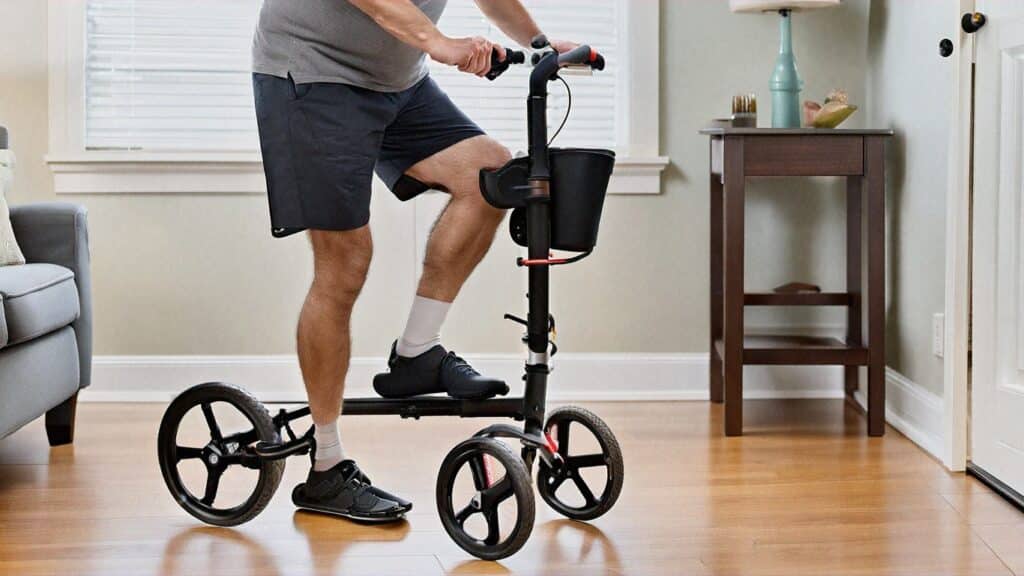For over a decade, I’ve been helping people understand Medicare. I’ve seen firsthand the confusion surrounding medical coverage. A question I hear all the time is, “Are knee scooters covered by Medicare?” It’s a valid question, especially when facing an injury and figuring out how to manage daily activities.
Let’s learn more about this common question and what you can expect from Medicare.
Are Knee Scooters Covered by Medicare?
Original Medicare generally doesn’t cover knee scooters, which can be confusing for folks who need one after surgery or an injury. Medicare views knee scooters as a “convenience” item because crutches, a more traditional mobility aid, can often serve the same purpose. However, Medicare already covers crutches and wheelchairs under durable medical equipment (DME), and knee scooters fall outside those guidelines.
Don’t despair yet. There might be other ways to get coverage for a knee scooter.
While it’s not guaranteed, some Medicare Advantage plans offer additional coverage for DME. This could include knee scooters. Keep in mind that coverage varies significantly between Medicare Advantage plans and providers.
If you have Medicare Supplement Insurance, your coverage benefits are the same as that of Original Medicare. If Original Medicare doesn’t cover it, your Medigap plan won’t either.
Do I Qualify For a Knee Scooter With a Medicare Advantage Plan?
It is important to check with your specific Medicare Advantage plan and ask them directly if they provide coverage for knee walkers.
They can tell you about the specifics of your plan. They can tell you about any requirements or limitations on DME. For example, you might need prior authorization or a prescription from your healthcare provider.
Medicare Advantage plans work differently from Original Medicare. Instead of being run by the federal government, private insurance companies offer them. This means they have the flexibility to offer extra benefits. However, they also have more specific rules and networks.
Can Medicaid Help?
Standard Medicare doesn’t typically include knee scooters. Exploring alternative resources, like Medicaid, is a good next step. Medicaid is designed for those with limited incomes and resources and provides coverage for certain medical equipment.
However, this coverage varies from state to state. Contact your state’s Medicaid office to understand their rules and ask what medical equipment is covered.
What If Neither Option Works?
Don’t lose hope if neither Medicare Advantage nor Medicaid provides coverage for a knee scooter. There are a few alternative routes to consider. Renting a knee scooter can be a more affordable option than buying one. A scooter rental can cost as little as $30 a week.
Also, consider checking online marketplaces for gently used scooters and exploring discounts through medical supply companies. You might need to research, but finding a solution is possible.
Conclusion
Navigating Medicare, especially after an injury, can feel overwhelming. You might be wondering, “Does Medicare cover knee scooters?”. Although traditional Medicare Part B and Medicare Supplement plans don’t typically cover them, some Medicare Advantage plans might offer this coverage. To be sure of your coverage, always reach out directly to your plan provider. Additionally, don’t hesitate to contact your state’s Medicaid office if you think you might qualify – it’s better to ask than assume. Good luck in your recovery and your quest for the best Medicare coverage.
Frequently Asked Questions About Medicare’s Coverage of Knee Scooters
1. Does Medicare cover the cost of a knee scooter?
Medicare typically does not cover knee scooters, as they are considered mobility aids and are categorized under Durable Medical Equipment (DME). However, some Medicare Advantage plans may offer additional coverage for these devices.
2. How can I get a knee scooter covered by my Medicare plan?
While Original Medicare does not generally cover knee scooters, you may want to check with your Medicare Advantage (Part C) provider. Some plans may include extra benefits for mobility aids, such as knee scooters, especially if medically necessary.
3. What are the alternatives to a knee scooter that Medicare might cover?
Medicare Part B may cover more traditional mobility aids, such as crutches, walkers, or wheelchairs if prescribed by a doctor. These are more commonly recognized as necessary for mobility.
4. What do I need to do if my doctor recommends a knee scooter?
If your doctor recommends a knee scooter, you can still contact your Medicare Advantage plan provider to see if they offer coverage. Your doctor can provide a prescription, which may help if your plan offers mobility device benefits.
5. Are knee scooters considered Durable Medical Equipment (DME)?
Yes, knee scooters fall under Durable Medical Equipment (DME). However, Medicare’s coverage for DME is limited to items deemed medically necessary, and knee scooters are often not included.
6. Can I rent a knee scooter and have it covered by Medicare?
Typically, Medicare will not cover the rental of a knee scooter. However, renting could be a more affordable if your Medicare plan does not provide coverage.
7. How can I reduce the cost of a knee scooter if it’s not covered by Medicare?
You can look into renting a knee scooter from a local pharmacy or medical supply store, which may be more cost-effective. Some retailers also offer used knee scooters at a lower price, and certain Medicare Advantage plans may provide partial coverage.
8. What mobility aids are most commonly covered by Medicare?
Medicare Part B generally covers devices like canes, walkers, wheelchairs, and mobility scooters when medically necessary and prescribed by a doctor. You may need to meet specific conditions and use a Medicare-approved supplier for coverage.
